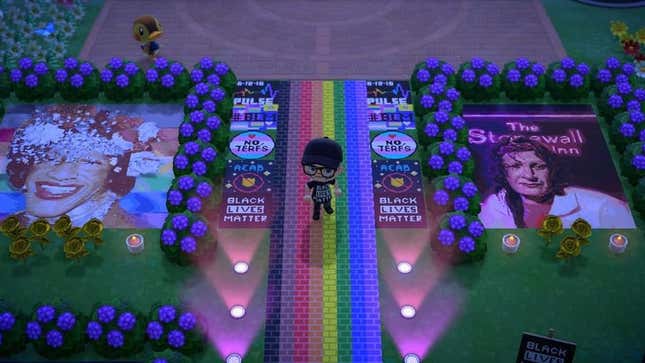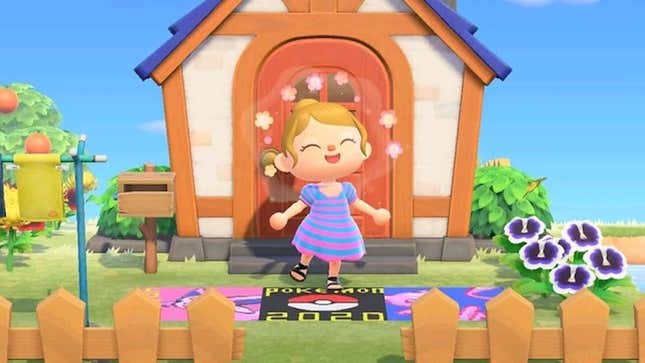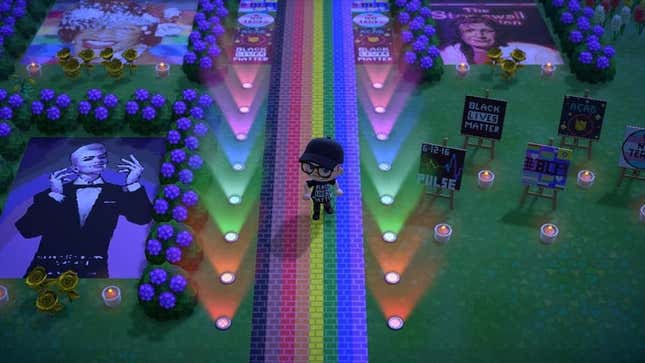
On May 28, Daisy stood on a pink-and red-striped flag, a gray beret perched atop her magenta hair, waiting for her friends to fly into her island on Dodo Airlines. One by one, seven of them arrived and stood on the dock awaiting Daisy’s instructions. Meanwhile, at her parents’ home in the southern United States, Daisy’s creator Sarah, a 20-year-old college student and Animal Crossing: New Horizons player, gripped her Nintendo Switch controller, her heart pounding.
You’re going to race each other, Sarah texted her friends, who were also videochatting with her on Zoom as they played. Ready, set, go!
In ball caps and straw caps, green hair and fancy sweaters, her friends ran through a rainbow path Sarah had created, past blossoming cherry trees and the Able Sisters design store. An elephant and a lion, permanent residents of Daisy’s island, looked on.
Sarah (whose name has been changed to protect her privacy) began to shake as her friends’ avatars bounded up the stairs and landed on top of the flag. Once they’d all arrived, she texted them,“I’m gay.”
On Zoom, her friends laughed. “That’s cute,” one said. They thought Sarah was kidding. “Wait, are you serious?” She said yes, and they screamed and cheered over Zoom as they pushed a few buttons to make their Animal Crossing characters do the same. Over Zoom, they told her they loved her no matter what and that they were proud of her. “Only you would come out in such an extra way,” one said.
“It was just very overwhelming, but like in the most positive way,” Sarah said over the phone. “There were just a lot of times where I’ve been doubting myself and doubting my judgment. And it kind of made things feel better.”
Sarah is one of a handful of players who have come out on Nintendo’s Animal Crossing: New Horizons during the coronavirus pandemic. Some, like Sarah, are isolating at home with parents and siblings who they aren’t comfortable coming out to. In Sarah’s case, her brother had just come out to their parents in December, and she “didn’t want to give her Mom a heart attack” if she came out “too soon.” She and her friends had been playing Animal Crossing together every night for the past month, so she felt like “it was the perfect way” to come out.
Other Animal Crossing players have used the game to create queer utopias, filled with rainbow gardens, squirrels wearing Trans Rights shirts, and memorials to gay rights heroes. They’ve created multiple subreddits, Facebook groups, and Discords. The game appeals to many queer players for a number of reasons. Those I spoke with said it allowed them to create a virtual world where they could express themselves while quarantining with family members who don’t know their sexuality, or while they’re exploring their gender identity. Players have held pride marches, created leather bars, and recreated RuPaul’s Drag Race. Animal Crossing’s customization options combined with its lack of violence has drawn many queer players to the game.
“There’s a long history of people exploring their gender identities or their sexual identities through video games,” said Bo Ruberg, Assistant Professor of Film and Media Studies at the University of California- Irvine and author of Video Games Have Always Been Queer. “And people do it for different reasons. But the kind of one you hear most often is…it’s a safer space to get to try a different gender identity…and then eventually, maybe, come out.”
When 28-year-old Birmingham, Alabama-based Gwen Penny started playing Animal Crossing March 21, a day after the game came out, she designed her character to look like a basic guy: purple ball cap, short blonde hair, t-shirt, jeans, and boots. In New Horizons, players pick their “style” at the beginning of the game; while these options look either traditionally male or female, players can change their character’s appearance at any time, choosing from a wide variety of clothing and hairstyles. About a month later, Penny switched her character to look more feminine, with blonde hair pulled up in a bun, wearing a pink-and-blue striped mid-length dress and strappy black sandals.

“Nobody in the village thought twice when I went from the male starting clothes, to the 100% female presentation I adjusted to. If only real life was so accepting!” Penny wrote in an email interview. In New Horizons, non-player characters are accepting of players’ gender presentation, even when it strays from what might be considered typical. This is a change from previous Animal Crossing games, when clothing store owner Mabel would comment if male-presenting characters chose traditionally female clothes and vice versa.
Penny grew up in a strict Mormon sect that taught that being anything other than straight was immoral. Her parents sent her to conversion therapy as a teen. Although she suspected she was transgender, “[the religion] told me I was gay and God would heal me if I kept choosing the ‘righteous path,’” Penny said. “Because I was convinced it was a sin to feel the way I was feeling, I also became a very vocal advocate against LGBTQ+ rights. I am very ashamed of myself for those years.”
She married a woman and together they decided to leave the religion, but it wasn’t until she started playing Animal Crossing that she began to fully grapple with her gender dysphoria. She didn’t intend to try out her gender presentation in the game, but she decided to design her character so it would reflect her gender identity. “Going from appearing female 100% of the time in the game, and then in the real world appearing and presenting male, presented a difficult dichotomy. I found myself more and more longing to be more like my character!” she said.
After creating her female character, Penny posted a picture of her smiling Animal Crossing character wearing a rainbow dress and hat, arms akimbo, to the r/LGBT subreddit with this headline: “Animal Crossing is helping me deal with being buried in the closet. Maybe someday I could be myself, but for now, I hope you enjoy my pride design!” The response was overwhelmingly positive, and she was flooded with supportive DMs. “I think it gave me the extra push I needed to get the ball rolling on moving my transition forward. Because I realized that the feelings aren’t going away; I’ve felt them since I was 5,” Penny said. “Animal Crossing presented me my desired world. A world where I could be me and be accepted as me. I wanted that in the real world too. And so I’m trying now to make that my reality,” she said. Penny is now out to most of her family and friends, who have been very accepting of her. She plans on coming out to her work in September. “HR has guaranteed my job is safe and I’ll be able to use my chosen name and pronouns,” she said.
Ruberg says that it’s not just multiplayer games, such as Animal Crossing, where trans players who are not yet out can explore their gender identity: “Even in single player games, people will say…I went with the woman avatar. I was trans, but I hadn’t transitioned yet. And that was a chance for me to get to test out what it was like to inhabit that experience.”
Other players, like 24-year-old Andrew McGuire, are not only expressing their gender identities but also creating monuments to LGBT history. When you arrive at the dock of McGuire’s Stonewall Island, the first thing you see are the faces of three LGBT heroes framed with purple flowers and candles: Silvia Rivera, Marsha P. Johnson and Stormé DeLarverie. These three women fought back against police at the Stonewall Inn in New York City in 1969 and kicked off the gay rights movement. “Growing up we were never taught anything about Stonewall or any LGBTQIA+ history,” McGuire, who lives in Scotland, says. “I made the memorial so if people come to my island or see my island they can ask, ‘Who were these people? Why are they so important?’ And then I can help educate people.” Recently McGuire hosted a two-hour Pride tour of the island to six visitors, where they shared the history of the Stonewall uprising.
McGuire, who is gender fluid and uses they/them pronouns, says they’re able to have long hair and wear whatever they want in the game without having to worry about what the neighbors think. “If someone wants to wear a dress and have a beard…The options are there. No one judges you,” they said.

A 13-year-old queer Animal Crossing player from Maryland said that he’s only out to a few friends, but in the game his character is decked out in a rainbow hat and shirt, with rainbow patches on his cheeks. He thinks queer players are drawn to the game “because there’s a ton of ways to express yourself in it.”
Hilda (a pseudonym) is a 16-year-old who was born in Mexico and now lives in the U.S. with six family members, some of whom don’t know that she is transgender. For Hilda, “there is almost never a time when I am home alone and able to dress like I want to. However, that is not really an issue with Animal Crossing. I can wear whatever I want whenever I want to, which is admittedly pretty cool.” For her, the game appeals because it allows her to design clothes. “It’s one thing to be able to wear the dresses I want, it’s another to be able to MAKE the dresses that I want,” she said.
In the midst of 2020, Animal Crossing has been a bright spot for these LGBTQ players, a safe haven for them to be themselves, come out of the closet, and carry on with their daily Animal Crossing lives: catching flounder, harvesting peaches, watering lilies. As Sarah said, in Animal Crossing you can create a “new world… even though the world around you is kind of toppling over and crumbling…. You can still be with your friends and…express yourself and you have control over so many things. And it gives you a sense of peace through that and serenity.”
Hallie Lieberman is a sex historian and journalist. She’s the author of Buzz: A Stimulating History of the Sex Toy. She’s currently working on a book on the history of male sex workers. Her writing has appeared in The New York Times, Esquire, Vice, and Wired, among other outlets.